
On November 15, over 150 people protested against the Dakota Access Pipeline in New Orleans outside the US Army Corp of Engineers headquarters in a show of solidarity with the Standing Rock Sioux tribe, whose fight against the pipeline has made international news.
The New Orleans demonstration, one of over 100 planned in the US and 20 in cities worldwide, called on President Obama to deny Energy Transfer Partners, owner of Dakota Access pipeline, permission to complete the project.
The Sioux tribe contends that the pipeline will jeopardize their drinking water while the conglomerate behind the controversial Dakota Access oil pipeline insists that the pipeline will operate safely.
An analysis by the Center for Biological Diversity of federal data related to ETP shows the corporation’s argument is impossible to prove. The conglomerate is responsible for 29 pipeline safety incidents since 2006, in which 9,555 barrels of hazardous liquids were leaked.
Those numbers do not include a spill of 1,300 barrels of gasoline (55,000 gallons) in the vicinity of the Susquehanna River in Lycoming County, Pennsylvania, by Sunoco Logistics, which is part of ETP.
“The pipeline is being constructed illegally. They are breaking federal laws,” Waterkeeper Alliance president Robert F. Kennedy, Jr. said in a video address from the front line at Standing Rock, while actions were taking place in solidarity with the Sioux tribe worldwide.
“The people who are trying to stop them are demanding compliance with the law, so you have an outlaw company that is violating federal law and instead of deploying state action to stop the law breaker, the state is deploying this massive military might to stop people who are peacefully protesting and asking for law and order.”
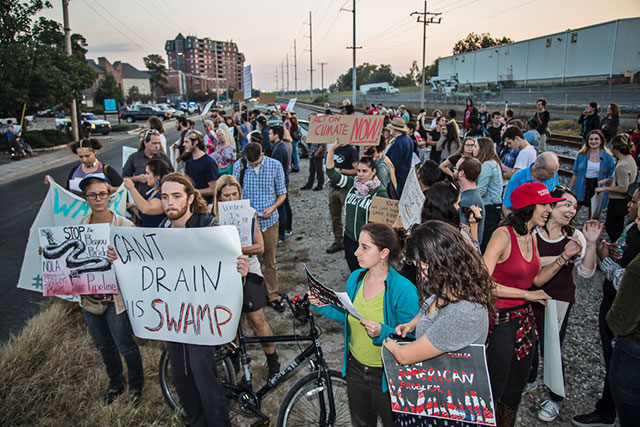 Protest in New Orleans, part of a National Day of solidarity with the Standing Rock Sioux tribe in North Dakota. (Photo: ©2016 Julie Dermansky)
Protest in New Orleans, part of a National Day of solidarity with the Standing Rock Sioux tribe in North Dakota. (Photo: ©2016 Julie Dermansky)
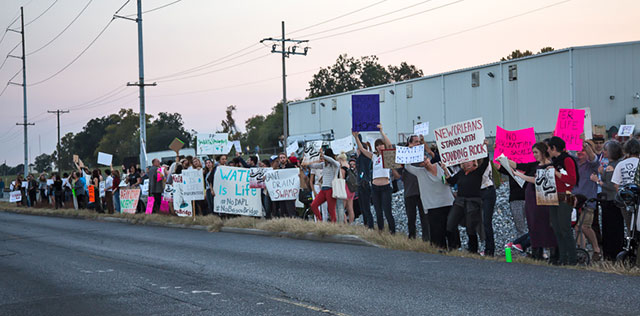 Protesters line the street in front of the US Army Corp of Engineers headquarters. (Photo: ©2016 Julie Dermansky)
Protesters line the street in front of the US Army Corp of Engineers headquarters. (Photo: ©2016 Julie Dermansky)
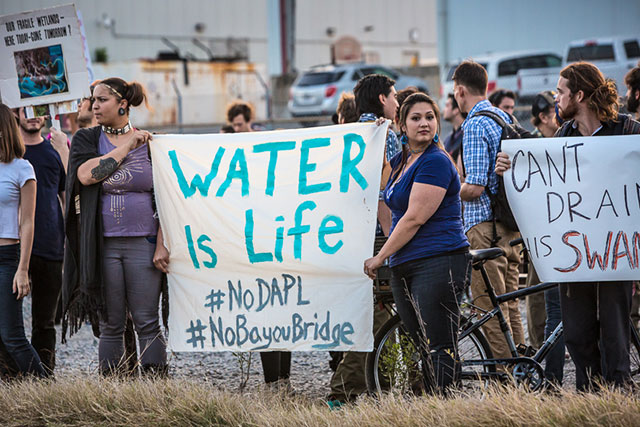 Protesters in front of the US Army Corp of Engineers headquarters. (Photo: ©2016 Julie Dermansky)
Protesters in front of the US Army Corp of Engineers headquarters. (Photo: ©2016 Julie Dermansky)
Bayou Bridge Pipeline Local Protest Angle
In New Orleans, environmental groups including the Gulf Restoration Network, Bold Louisiana, the Louisiana Bucket Brigade, the Sierra Club and 350.org called upon the US Army Corps of Engineers to prohibit Energy Transfer Partners (ETP) from building the Bayou Bridge Pipeline in Louisiana. The Bayou Bridge Pipeline, if built, will be the tail end of ETP’s pipeline network, bringing North Dakota’s fracked oil to the Gulf Coast.
During a rally before the group marched toward the entrance of the US Army Corp of Engineers headquarters on the banks of the Mississippi River, Anne Rolfes, director of the Louisiana Bucket Brigade, read from a list of 63 petrochemical company accidents reported to the EPA’s National Response Center over the course of two weeks.
“This industry has an accident problem. They don’t have any business putting in another new pipeline, whether it is here or in North Dakota,” Rolfes said.
(VIDEO: Cherri Foytlin)
Gulf Coast activist Cherri Foytlin, head of Bold Louisiana, had just returned from Standing Rock. She recounted her experiences at the camp in North Dakota and a brutal arrest she endured this summer in Baton Rouge, Louisiana during a protest over the police shooting of Alton Sterling.
“They are afraid of us,” she said, and the violence against peaceful protesters is a sign that they are making progress. She lead the group in chanting “I believe that we will win,” after explaining a win for the group is a win for everyone, even the owners of the pipeline, though the owners don’t understand that just yet.
The fight to stop the Dakota Access pipeline has shown no signs of waning. There have been over 400 arrests to date, and the militarized law enforcement response continues from local and out-of-state police, and private security guards hired by ETP.
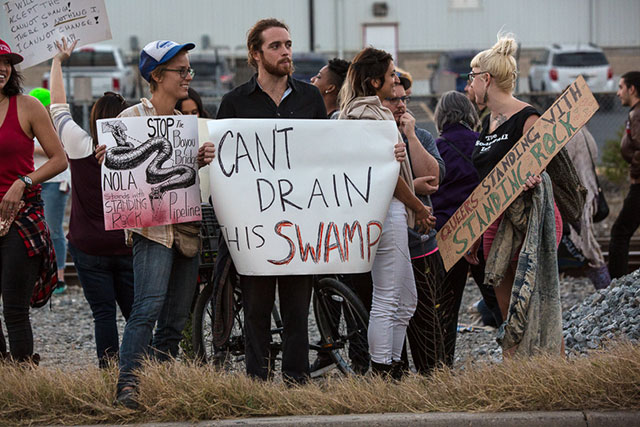 Chris Saudinger, a writer from New Orleans, holding a protest sign “can’t drain this swamp” among other protest signs. (Photo: ©2016 Julie Dermansky)
Chris Saudinger, a writer from New Orleans, holding a protest sign “can’t drain this swamp” among other protest signs. (Photo: ©2016 Julie Dermansky)
 T’Lark Galeas, Cherokee, Mayan Indigenous activist based in New Orleans, sheds tears as she expresses support for her friends and family at Standing Rock. (Photo: ©2016 Julie Dermansky)
T’Lark Galeas, Cherokee, Mayan Indigenous activist based in New Orleans, sheds tears as she expresses support for her friends and family at Standing Rock. (Photo: ©2016 Julie Dermansky)
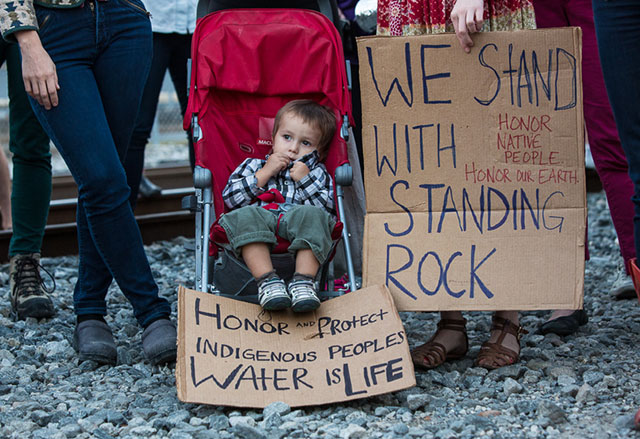 Young and old gather in solidarity with Standing Rock Water Protectors. (Photo: ©2016 Julie Dermansky)
Young and old gather in solidarity with Standing Rock Water Protectors. (Photo: ©2016 Julie Dermansky)
Resistance to the Bayou Bridge Pipeline in Louisiana is growing. The Bayou Bridge Pipeline, if built, will be the southern end of ETP’s pipeline. According to the Gulf Restoration Network, “The Bayou Bridge pipeline would move fracked oil to key Gulf refineries and export facilities. Its footprint is significant: over 160 miles, more than 600 wetland acres, almost 700 waterbodies.”
The group points out that extreme weather events, exacerbated by climate change, are already causing severe environmental and economic impacts in Louisiana and warn the construction of the pipeline would cause further destruction of wetlands.
“We have so many pipelines crossing Louisiana. If you look at a map of pipelines in Louisiana, the state is completely covered, the last thing we need is another one,” said Margie Vicknair Pray, conservation coordinator at the Sierra Club, Delta Chapter. “If we don’t start now with keeping It in the ground, how are we ever going to transition to renewable energy?”
The likelihood of stopping either pipeline is fading.
President-elect Trump has not minced words about where he stands when it comes to the oil and gas industry. Not only does he have a personal financial stake in Energy Transfer Partners, he insists he will undo many EPA regulations that he claims are stifling industry.
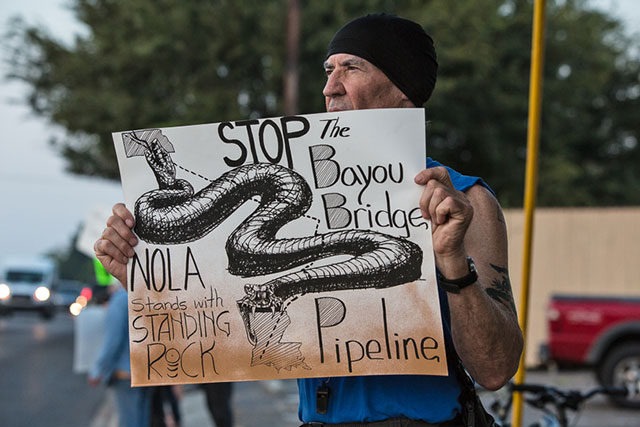 Protest in New Orleans during the national day of solidarity with the Standing Rock Sioux tribe. (Photo: ©2016 Julie Dermansky)
Protest in New Orleans during the national day of solidarity with the Standing Rock Sioux tribe. (Photo: ©2016 Julie Dermansky)
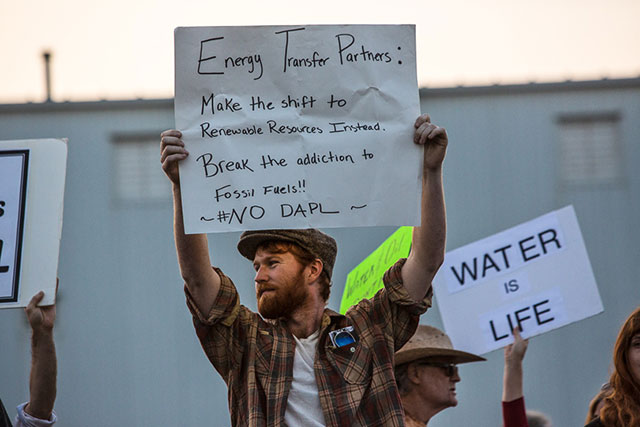 Protest in New Orleans during the national day of solidarity with the Standing Rock Sioux tribe. (Photo: ©2016 Julie Dermansky)
Protest in New Orleans during the national day of solidarity with the Standing Rock Sioux tribe. (Photo: ©2016 Julie Dermansky)
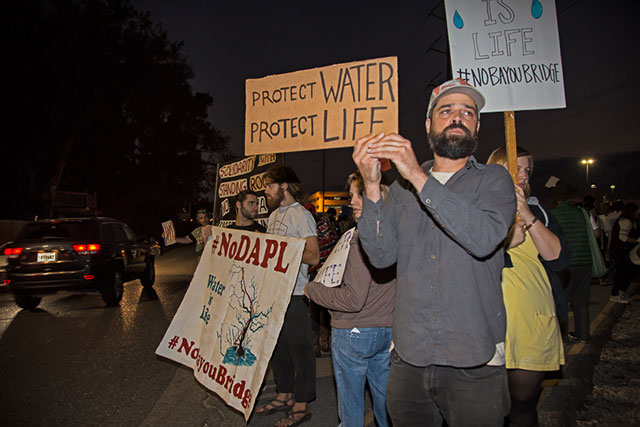 Protesters line the street in front of the US Army Corp of Engineers headquarters. (Photo: ©2016 Julie Dermansky)
Protesters line the street in front of the US Army Corp of Engineers headquarters. (Photo: ©2016 Julie Dermansky)
 Jayeesha Dutta holding water collected from the Cannon Ball river that is part of a sacred water exchange with the Gulf, Isle de Jean Charles Band of Biloxi-Chitimacha-Choctaw Indians, that will be completed on November 21. (Photo: ©2016 Julie Dermansky)
Jayeesha Dutta holding water collected from the Cannon Ball river that is part of a sacred water exchange with the Gulf, Isle de Jean Charles Band of Biloxi-Chitimacha-Choctaw Indians, that will be completed on November 21. (Photo: ©2016 Julie Dermansky)
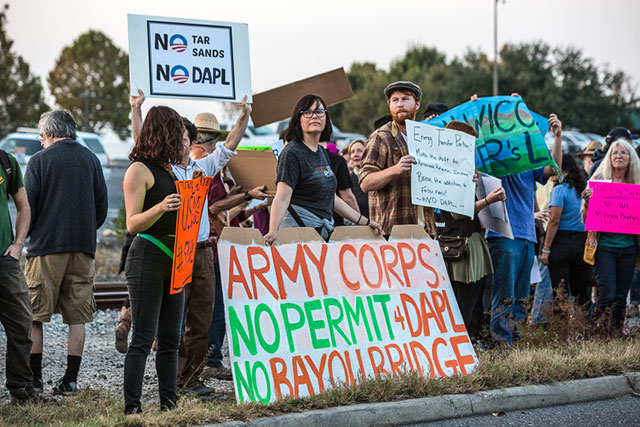 Protesters line the street in front of the US Army Corp of Engineers headquarters. (Photo: ©2016 Julie Dermansky)
Protesters line the street in front of the US Army Corp of Engineers headquarters. (Photo: ©2016 Julie Dermansky)
Our most important fundraising appeal of the year
December is the most critical time of year for Truthout, because our nonprofit news is funded almost entirely by individual donations from readers like you. So before you navigate away, we ask that you take just a second to support Truthout with a tax-deductible donation.
This year is a little different. We are up against a far-reaching, wide-scale attack on press freedom coming from the Trump administration. 2025 was a year of frightening censorship, news industry corporate consolidation, and worsening financial conditions for progressive nonprofits across the board.
We can only resist Trump’s agenda by cultivating a strong base of support. The right-wing mediasphere is funded comfortably by billionaire owners and venture capitalist philanthropists. At Truthout, we have you.
We’ve set an ambitious target for our year-end campaign — a goal of $250,000 to keep up our fight against authoritarianism in 2026. Please take a meaningful action in this fight: make a one-time or monthly donation to Truthout before December 31. If you have the means, please dig deep.